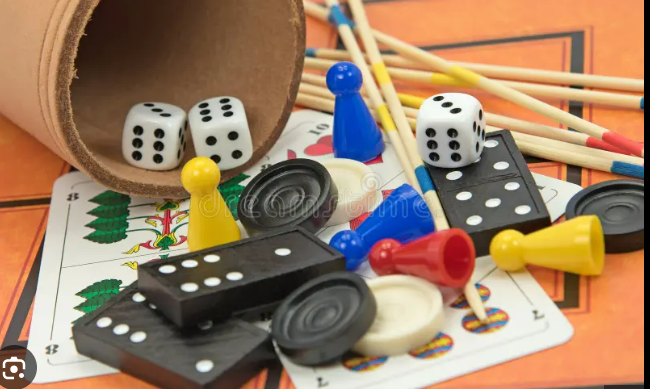Les Origines Enracinées : Un Voyage à Travers le Temps
The human desire to play is as old as civilization itself. From the simplest forms of amusement in ancient times to the complex digital worlds of today, les jeux have always held a significant place in our societies.
Consider the ancient board games discovered in archaeological digs, such as Senet in Egypt or the Royal Game of Ur in Mesopotamia. These weren’t mere pastimes; they often held ritualistic or strategic significance, reflecting the values and concerns of their respective cultures. The dice, the board, the pieces – these were the rudimentary tools of early gaming, fostering social interaction and intellectual engagement.
The Greeks and Romans also embraced various forms of play, from athletic competitions that evolved into the Olympic Games to more leisurely pursuits like knucklebones and dice games. These activities were integral to their social fabric, providing opportunities for camaraderie, competition, and the development of physical and mental prowess.
The Middle Ages saw the rise of chess, a game steeped in strategy and symbolism, often reflecting the hierarchical structures of feudal society. Jousting tournaments and other forms of medieval games provided spectacle and entertainment, while also serving as displays of skill and valor.
L’Ère de la Transformation : Des Jeux de Société aux Mondes Virtuels
The invention of the printing press in the 15th century marked a turning point, making playing cards and other forms of printed games more accessible. Board games continued to evolve, with new mechanics and themes emerging over time. Games like Ludo and Snakes and Ladders, with their simple rules and reliance on chance, became popular forms of family entertainment.
The 20th century witnessed an explosion of innovation in the world of les jeux. The advent of electronic technology revolutionized how we play. The first video games, like Tennis for Two and Pong, were rudimentary but groundbreaking, paving the way for an entirely new form of interactive entertainment.
The arcade era of the late 1970s and early 1980s brought iconic games like Pac-Man, Space Invaders, and Donkey Kong, captivating a generation with their pixelated graphics and addictive gameplay. These games weren’t just about entertainment; they fostered a sense of community and competition in the dimly lit arcades.
The rise of home consoles in the 1980s and 1990s, with systems like Atari, Nintendo, and Sega, brought the arcade experience into living rooms. Games became more sophisticated, with richer storylines, more complex mechanics, and increasingly immersive worlds. The advent of the internet in the late 20th century further transformed the gaming landscape, enabling multiplayer experiences and the creation of vast online communities.
Le Paysage Contemporain : Diversité et Innovation
Today, the world of les jeux is incredibly diverse and dynamic. From AAA blockbuster video games with photorealistic graphics and sprawling open worlds to indie darlings that push creative boundaries, there’s something for every taste and preference.
Mobile gaming has democratized access to les jeux, with smartphones and tablets becoming ubiquitous gaming platforms. Casual games, puzzle games, and social games have found a massive audience, offering entertainment on the go.
Esports has emerged as a major cultural phenomenon, with professional gamers competing in tournaments for significant prizes and attracting millions of viewers worldwide. Games like League of Legends, Dota 2, and Counter-Strike: Global Offensive have become1 global spectacles, blurring the lines between gaming and traditional sports.
The rise of virtual reality (VR) and augmented reality (AR) technologies promises to further revolutionize the gaming experience, offering new levels of immersion and interactivity. Imagine stepping into a virtual world or having game elements overlaid onto your real-world surroundings – the possibilities are truly exciting.
L’Impact Culturel et Sociétal : Bien Plus Qu’un Simple Divertissement
Les jeux are not merely a form of entertainment; they have a profound impact on our culture and society. They can be powerful tools for learning, fostering problem-solving skills, strategic thinking, and creativity. Many games require collaboration and communication, strengthening social bonds and teamwork.
Educational games can make learning engaging and fun, while serious games are used in various fields, such as healthcare, training, and urban planning, to simulate real-world scenarios and facilitate learning.
However, the world of les jeux also faces its challenges. Concerns about addiction, violence in video games, and the potential for social isolation are important considerations that need to be addressed through research, education, and responsible game design.
L’Avenir du Jeu : Un Horizon Infini
The future of les jeux is brimming with possibilities. Technological advancements will continue to push the boundaries of what’s possible, with artificial intelligence, cloud gaming, and new forms of interaction promising to reshape the gaming experience.
We can expect to see even more personalized and immersive games, tailored to individual preferences and abilities. The lines between the real and virtual worlds may continue to blur, with new forms of mixed reality experiences emerging.
The social aspect of gaming will likely continue to evolve, with online communities becoming even more integrated into our lives. Games may play an increasingly important role in education, healthcare, and other areas beyond entertainment.
Conclusion : Une Tapisserie Ludique en Constante Évolution
From the ancient games played by our ancestors to the sophisticated digital worlds of today, les jeux have been an integral part of the human experience. They entertain, challenge, connect, and inspire us. The world of les jeux is a vibrant and ever-evolving tapestry, reflecting our creativity, our ingenuity, and our enduring desire to play. Alors, que le jeu continue!

